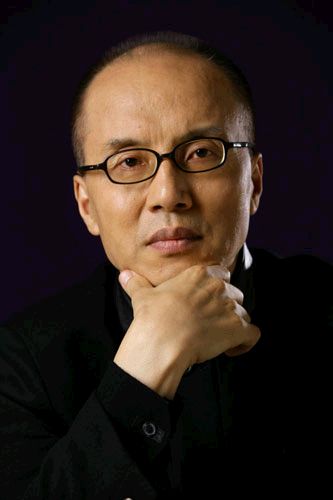Despite surface shimmer, Chinese work provides mixed rewards at Grant Park Music Festival

Blending musical traditions can be risky business. Instruments like the Indian sitar or the Chinese pipa can be simply swallowed up by the full force of a standard Western orchestra. And Western orchestras can sound clumsy when they venture into the unfamiliar rhythms and harmonies of traditional music from Afghanistan or Egypt.
The Grant Park Music Festival’s attempt this weekend at musical cross-pollination –Qigang Chen’s Iris dévoilée (Iris Unveiled), a 2001 work for orchestra, traditional Chinese instruments and two vocal soloists– doesn’t entirely avoid the pitfalls. But as sensitively performed by the Grant Park Orchestra under Carlos Kalmar’s baton Friday night at the Pritzker Pavilion and scheduled to be repeated Saturday, the 35-minute piece had its transcendent moments.
The evening benefitted from Kalmar’s gift for assembling intriguing programs. Rather than simply dropping Chen’s atmospheric Iris into a standard-issue concert, he heightened the effect by pairing it with two equally fantasy-infused works: Faure’s suite of incidental music for Maeterlinck’s symbolist play, Pelleas et Melisande, and Ravel’s La Valse.
Born in China in 1951, Chen studied with Olivier Messiaen in Paris and is thoroughly at home in both the western classical tradition and the world of Chinese music. A nine-movement study of the so-called Eternal Feminine, that ages-old preoccupation of male artists, Iris dévoiléewas full of brilliant orchestral color Friday night. In the opening movement, violins shimmered and woodwind choirs hovered, their slow-moving chords creating a sense of vast, transparent space. Periodically throughout the work, a solo violin emerged in poignant song. Though the orchestral sound was tightly woven, the playing was lithe, instantly responsive to the sweep of Kalmar’s baton. Occasionally there were bracing outbursts, full of spiky, percussive clatter. But eventually the piece’s prevailing slow, introspective mood became tiresome.
Five gifted soloists supplemented the Grant Park Orchestra. Sopranos Wu Yanyu and Meng Meng, who sang in traditional Chinese style, played major roles. In the piece’s wordless solos, Wu Yanyu’s soprano sounded open, clear and powerful, soaring easily above the orchestra. As a soloist who has appeared as Mozart’s Queen of the Night, she had no difficulties with Chen’s demanding coloratura’s flights.
Wearing a brilliantly colored satin gown and the glittering headdress of a traditional Chinese opera singer, Meng Meng was equally confident. The tight, high-pitched keening of her voice and its swooping vocal line were a fascinating contrast to Wu Yanyu’s more rounded, deliberate sound.
The three instrumentalists–Wei-Yang Andy Lin on erhu (Chinese fiddle), Yang Wei on pipa (a type of lute) and Yang Yi on zheng (a kind of zither)—had too little to do. But the interplay between erhu and the vocal soloists was often mesmerizing. At times the erhu seemed to become a third singer—its low, mellow voice filling the middle space between the two highly contrasted soprano lines.
Closing the concert with two familiar works by Faure and Ravel, Kalmar and his orchestra maintained their focus on orchestral color and precise detail. Kalmar grew up in Austria and has the lilt of Strauss waltzes, which Ravel had in mind while writing La Valse, in his bones. He gave Ravel’s dark, unsettled undercurrent its due, but there were playful fits and starts in the work’s sunnier moments.
The four movements of Faure’s Pelleas and Melisande Suite were thoughtfully explored, from the hymn-like simplicity of the Prelude to the dignified restraint of the Death of Melisande.
The program will be repeated 7:30 p.m. Saturday. grantparkmusicfestival.com
Posted in Performances


